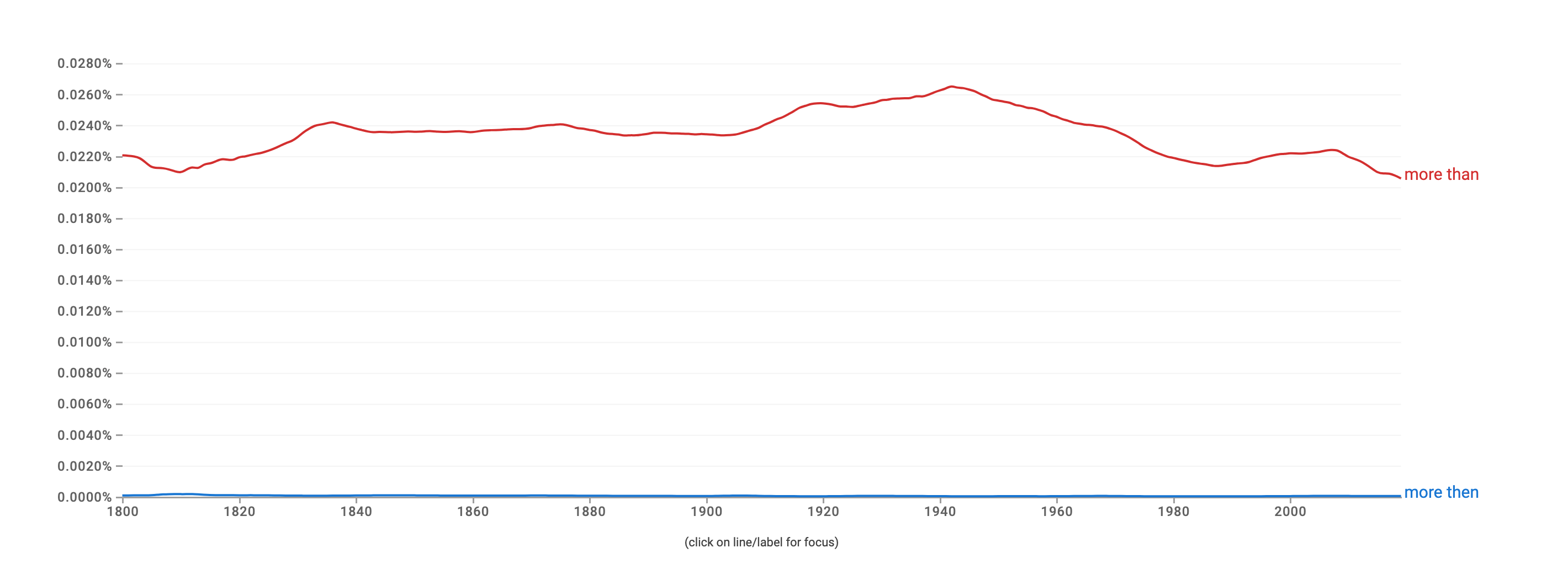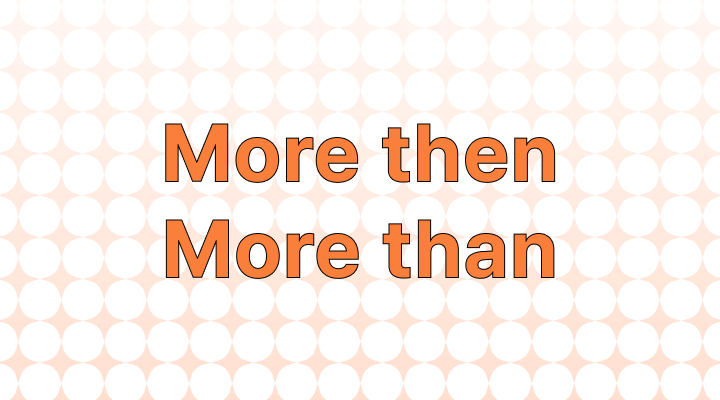- "More then" is the incorrect variant of "more than."
- "More than" is used to indicate a greater quantity, degree, or extent.
✅ She has more than enough time to complete the task.
In the sentence "She has more than enough time to complete the task," the phrase "more than" is used to convey an excess or surplus beyond what is necessary. It indicates that the amount of time she has is not just sufficient but exceeds the required or expected duration for completing the task.
More than
Part of Speech: conjunction, preposition
Definition:
Conjunction: Used to introduce a clause expressing:
- Addition: "She bought bread and milk, more than she needed."
- Excess: "I have more than enough, please take some."
- Amplification: "The storm was more than just rain, it was a hurricane."
- Alternative: "We could stay here, or do you want to go out? It's up to you, more than anything."
Preposition: Used to introduce:
- Comparison: "He is more than just a friend, he's family."
- Quantity exceeding a norm or expectation: "He worked more than ten hours straight."
- Probability: "There's more than a chance she'll be late."
- Specific amount: "Give me more than a spoonful, I'm hungry."
Examples:
- "There's more than meets the eye." (conveys mystery or hidden meaning)
- "She wanted more than she had." (expresses desire or ambition)
- "He is more than kind, he's compassionate." (compares qualities)
- "I can't lift more than ten pounds." (indicates limit)
Examples from the web
"He's more than capable." - Independent
"'He more than anybody.'" - The New Yorker

Examining the graph below, we can see that the correct phase "more than" is used more frequently than its incorrect variant "more then."

How do we pronounce "more than?"
In American English, "more than" is pronounced mawr than.
In British English, "more than" is pronounced mawr than. The pronunciation of "o" in "more than" is longer in British English.
These are just the standard pronunciations, and there may be slight variations depending on regional accents and individual speech patterns.
Why does the misspelling of "more than" as "more then" occur?
The misspelling of "more than" as "more then" may occur due to a few common reasons:
- Phonetic confusion: The words "than" and "then" sound similar, and people may sometimes spell them interchangeably if they rely on the way the words sound.
- Typographical errors: Simple typing mistakes can lead to the substitution of "than" with "then" or vice versa, especially if one is not paying close attention while typing.
- Lack of awareness: Some individuals may not be fully aware of the correct spelling and usage of these words, leading to errors when writing.
- Homophones: "Than" and "then" are homophones, words that sound the same but have different meanings. This similarity in sound can contribute to confusion and misspellings.
Other common misspellings of "more than"
- more thn
- more tham
- more taan
- more thann
Example sentences for the misuse of the word "more than" vs. "more then"
- It's crucial to avoid the common mistake of using "more then" as it is an incorrect spelling; the proper phrase is "more than."
- Using "more then" is a spelling error that can undermine the clarity of your writing; always opt for the correct form, which is "more than."
- Remember that "more then" is not an accepted variation; the accurate spelling when expressing a comparison is "more than."
- In formal writing, it's essential to steer clear of the misspelling "more then" and use the correct term "more than" for accurate and polished language.
- Don't let the common typo of "more then" slip into your writing; the correct phrase, denoting comparison, is "more than."
Example sentences of "more than"
- She had more than enough time to complete the project ahead of the deadline.
- The restaurant received more than a hundred reservations for the special New Year's Eve dinner.
- His dedication to the job was evident, as he worked more than the required hours to ensure success.
- The athlete displayed more than just skill; her passion for the sport was evident in every move.
- The novel was more than just a story; it served as a profound exploration of human nature and society.
Synonyms for more than
- Greater than: The cost of repairs turned out to be greater than expected.
- Beyond: Her kindness went beyond what was required, leaving a lasting impact.
- Exceeding: The project's success exceeded our initial expectations.
- Surpassing: The beauty of the landscape was surpassing anything we had seen before.
- Above: The temperature reached above the average for this time of year.
Summary
The distinction between "more than" and "more then" may seem subtle, but it plays a crucial role in conveying accurate meanings. By recognizing the correct usage, you can ensure that your writing is clear, precise, and free from common linguistic pitfalls. So, the next time you find yourself comparing or quantifying, remember to reach for "more than" to maintain linguistic accuracy and clarity.

Want to sound like a native speaker?
Engram’s AI-powered grammar checker makes your English sound like a native speaker’s, suggesting natural English expressions on top of fixing grammar, spelling, punctuation, word order, and vocabulary.

References:














